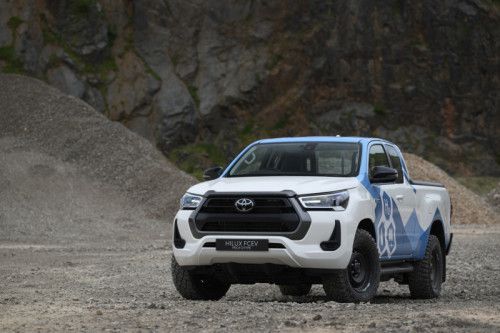

Toyota's groundbreaking hydrogen fuel cell Hilux project has entered its final phase, marking a significant milestone in the company's journey towards a zero-carbon future. Since the unveiling of the first prototype in September 2023, Toyota and its consortium partners, supported by UK Government funding, have progressed to an intensive evaluation and demonstration stage.
The latest development in this collaborative project underscores Toyota’s comprehensive strategy for carbon neutrality, utilizing various powertrain solutions such as hybrid electric, plug-in hybrid electric, battery electric, fuel cell electric, and e-fuels to meet diverse user needs and local infrastructure requirements.
A total of 10 hydrogen fuel cell Hilux prototypes have been built at the Toyota Motor Manufacturing UK (TMUK) facility in Derby, England. Five vehicles are undergoing rigorous field testing to evaluate safety, performance, functionality, and durability in real-world situations. The remaining five units are engaged in customer and media demonstrations, including two at the upcoming Olympic and Paralympic Games Paris 2024. By showcasing hydrogen fuel cell technology, Toyota aims to lay the foundation for a thriving hydrogen transport sector in the future.
Advancing Hydrogen Technology
Toyota's 30 years of research and development into hydrogen fuel cells have been pivotal in this project. The insights gained from the Hilux project will contribute to the next generation of fuel cell technology, promising longer lifecycles, increased driving ranges, and significantly reduced costs.
Toyota anticipates that Europe will be one of the largest hydrogen fuel cell markets by 2030, with steady growth in mobility and power generation applications. In December 2023, Toyota Motor Europe (TME) announced the establishment of the Hydrogen Factory Europe, which will coordinate the development, production, sales, and aftersales of hydrogen technology.
The fuel cell Hilux prototype project is crucial in advancing hydrogen technology and stimulating the broader deployment of hydrogen ecosystems and infrastructure across Europe.
Vehicle Profile
Based on the legendary Toyota Hilux, known for its Quality, Durability, and Reliability (QDR), the hydrogen fuel cell prototype retains the same rugged dimensions and appearance as the latest Hilux model. The fuel cell Hilux combines Toyota Mirai's proven technology with an expected driving range of up to 600 km, surpassing the range of many battery electric systems.
Hydrogen is stored in three high-pressure fuel tanks, with a total system capacity of 7.8 kg, mounted within the ladder frame chassis. The polymer electrolyte fuel cell stack, containing 330 cells, is positioned above the front axle. The rear-wheel-drive system, powered by an e-motor on the rear axle, delivers 134 kW (182 DIN hp) and 300 Nm of torque. Emitting only pure water, the fuel cell Hilux operates with zero tailpipe emissions.
A Lithium-ion hybrid battery, storing electricity produced on-board by the fuel cell, is located in the rear load deck, maintaining the cabin space.
Project Overview
The hydrogen fuel cell Hilux project began with a feasibility study in early 2022, leading to funding from the UK Government's Advanced Propulsion Centre. The intense design and development program, from July 2022 to January 2023, involved consortium partners Ricardo, ETL, D2H Advanced Technologies, Thatcham Research, and additional support from Toyota Motor Corporation.
Prototype construction, following Toyota Production System principles, took place from June to July 2023, with ten prototypes assembled. These prototypes are now undergoing field testing and customer engagement activities, concluding the final phase of this research and demonstration project.
Consortium Members
For more information about the latest Toyota models and used cars in Dubai, visit Auto Trader UAE.